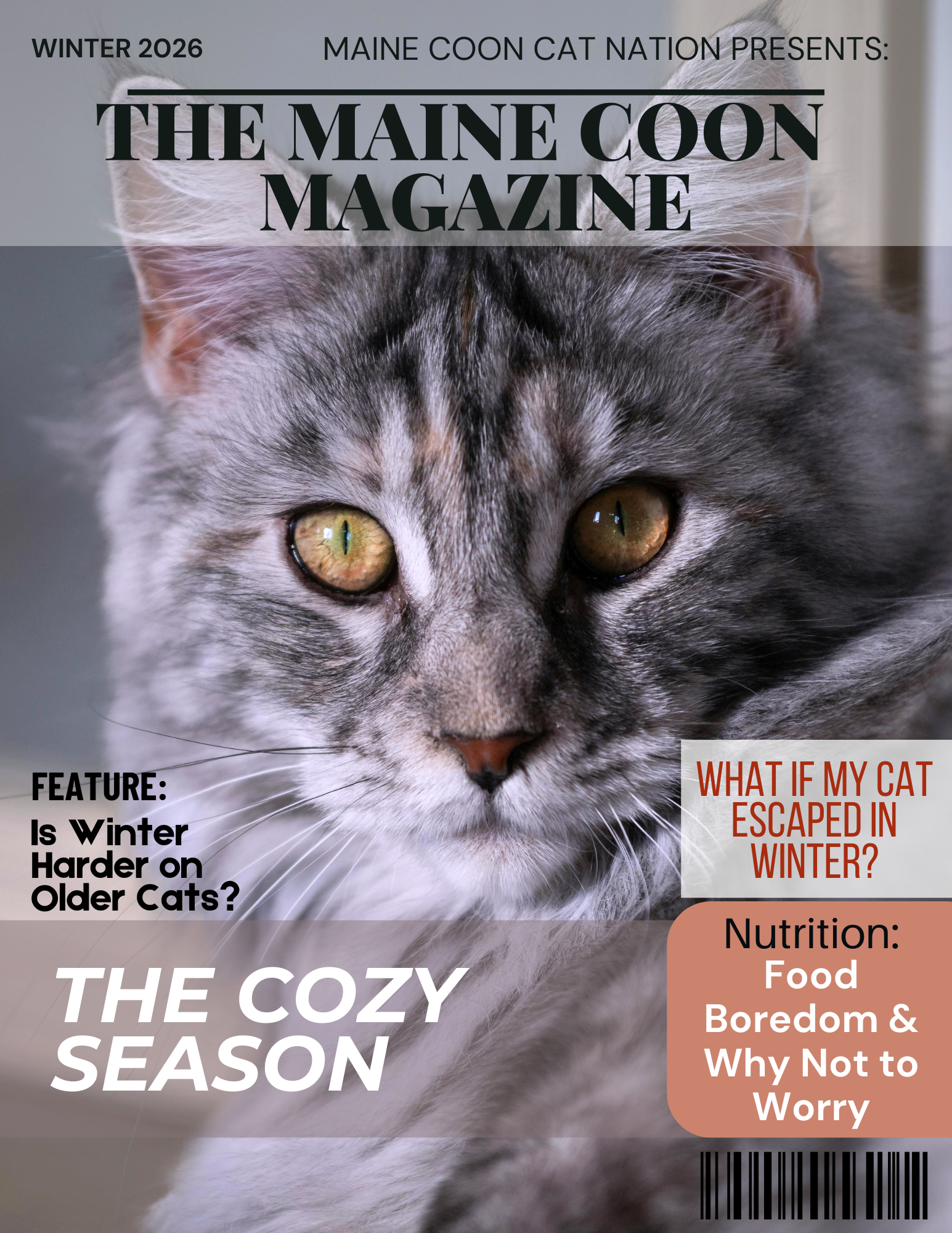- Home
- Maine Coon Cat Health
- Maine Coon Neutering
Male Maine Coon Neutering
Most owners take for granted that male Maine Coon neutering will be done, but may still have questions such as "when is the right age?" and "what are the risks?" and more.
If you like this, you'll love our fun, free Daily Digest!

Let's take an in-depth look at pros and cons, the "right" age, and common questions and myths about neutering Maine Coon kittens and cats.
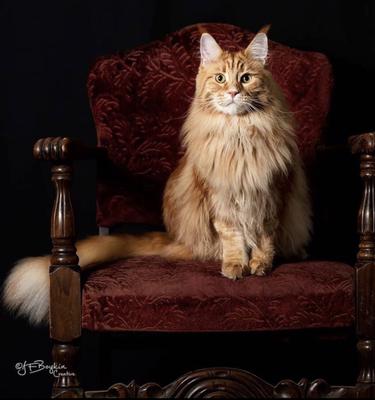 Shere Khan
Shere KhanMaine Coon Neutering Overview
Neutering a male cat or kitten, or spaying a female, involves surgical procedures performed under general anesthesia.
The specifics of the process vary slightly between male and female cats, but generally include the following steps:
Pre-Surgical Preparation
Health Assessment:
The veterinarian conducts a thorough health check to ensure the cat is fit for surgery. This may include blood tests to assess overall health and organ function.
Fasting:
Cats are typically required to fast for several hours before surgery to reduce the risk of complications during anesthesia.
Anesthesia:
The cat is administered general anesthesia to ensure they are unconscious and do not feel pain during the procedure.
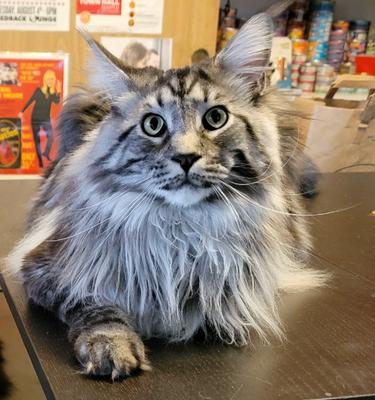 Biscuit
Biscuit
Surgical Procedure for Male Cats (Castration)
Incision:
A small incision is made in the scrotum.
Removal of Testicles:
The testicles are exposed through the incision, the spermatic cord is tied off (ligated) to prevent bleeding, and the testicles are removed.
Closing the Incision:
In many cases, the incisions are so small that they do not require sutures and are left to heal naturally. If sutures are used, they are often absorbable and do not need to be removed later.
Post-Surgical Care
Recovery from Anesthesia:
The cat is monitored as it wakes up from anesthesia. This is done in a warm, quiet area to ensure they recover safely.
Pain Management:
Pain relief medications are administered to manage post-operative discomfort. The veterinarian may prescribe additional pain medication for the cat to take at home.
Activity Restriction:
The cat’s activity is usually restricted for a few days to prevent complications. This means keeping the cat indoors and discouraging jumping or vigorous play.
Monitoring the Incision:
Owners are advised to monitor the surgical site for signs of infection or complications, such as swelling, redness, or discharge. If any concerns arise, a follow-up visit to the veterinarian is recommended.
E-Collar:
An Elizabethan collar (E-collar) may be used to prevent the cat from licking or biting at the incision site.
Long-Term Care
Follow-Up Visit:
A follow-up visit may be scheduled to ensure proper healing and to remove any non-absorbable sutures if used.
Behavioral Changes:
Owners may notice behavioral changes such as reduced aggression, decreased roaming, and the elimination of behaviors associated with mating.
Maine Coon neutering is a common and generally safe surgical procedure that provides numerous health and behavioral benefits for felines.
Proper preparation, skilled surgical technique, and careful post-operative care ensure the best outcomes for your kitty’s health and well-being.
Always consult with a veterinarian for specific instructions and care tailored to the individual pet's needs.
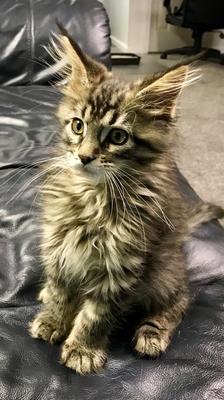 Zeke
Zeke
"Are There Any Reasons Not to Neuter a Male Maine Coon?"
While male Maine Coon neutering offers many health and behavioral benefits, there are a few reasons some owners or breeders might choose not to neuter.
These reasons typically fall into the following categories:
Breeding Purposes
- Breeding Programs: If a male Maine Coon is part of a registered breeding program, he will not be neutered until his breeding career is over. Breeders may want to preserve desirable traits and bloodlines.
Health Considerations
- Specific Health Conditions: In rare cases, a cat might have health conditions that make anesthesia or surgery risky. The decision to neuter should be carefully considered and discussed with a veterinarian to weigh the risks and benefits.
Owner Preference and Ethical Beliefs
- Ethical or Personal Beliefs: Some owners may have ethical or personal beliefs against neutering. They might prefer their cats to remain intact for various reasons, including cultural beliefs or personal philosophy on animal rights.
Potential Risks and Concerns
- Risks of Surgery: Although rare, there are risks associated with any surgical procedure, including complications from anesthesia, infection, or bleeding.
- Hormonal Impact on Development: Some owners believe that keeping a male Maine Coon intact might allow for more natural hormonal influences on physical development, potentially resulting in a larger, more muscular build. This belief is more anecdotal and lacks strong scientific backing but can be a consideration for some.
Myths and Misconceptions
- Myths About Maine Coon Neutering: Some owners might be influenced by myths and misconceptions, such as the belief that it will significantly change their cat’s personality in a negative way or that it is inherently unnatural.
Show Cats
- Showing in Intact Categories: For cat shows, some owners prefer to keep their cats intact to compete in specific categories for non-neutered cats. However, many shows have categories for both neutered and intact cats.
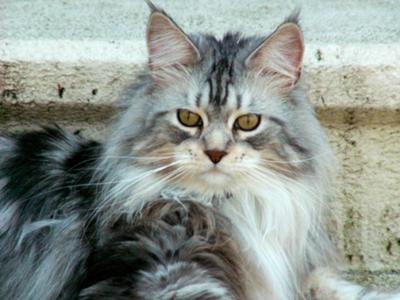 Murphy
Murphy
Balancing Benefits and Drawbacks
Health and Behavioral Benefits of Maine Coon Neutering
- Reduced Risk of Diseases: Decreases the risk of certain cancers and other health issues related to the reproductive system.
- Behavioral Improvements: Can reduce or eliminate behaviors such as spraying, marking, aggression, and the tendency to roam. This makes managing the cat at home easier and reduces the risk of accidents or fights.
- Population Control: Helps control the pet population, reducing the number of unwanted kittens and the burden on shelters.
While there are some reasons a male Maine Coon might not be neutered, the decision should be made after careful consideration of the cat’s health, intended use (such as breeding), and the owner's preferences and beliefs.
Consulting with a veterinarian can provide valuable insights and help balance the benefits and potential drawbacks based on the individual cat's situation.
Health Issues and Considerations
Male Maine Coon neutering, like any breed, has several health ramifications, both positive and potentially negative. Understanding these can help in making an informed decision.
Health Benefits and Issues Prevented
Prevention of Testicular Cancer
- Benefit: Castration eliminates the risk of testicular cancer since the testicles are removed during the procedure.
Reduction in Prostate Problems
- Benefit: It significantly reduces the risk of benign prostatic hyperplasia (enlarged prostate) and prostate infections.
Lower Risk of Hormone-Related Diseases
- Benefit: Conditions like perineal hernias and perianal adenomas, which are influenced by male hormones, are less likely to develop in neutered males.
Behavioral Benefits
- Benefit: Neutering reduces the likelihood of behaviors driven by testosterone, such as aggression, territorial spraying, and roaming, which can lead to accidents and fights.
Potential Health Risks and Issues Exacerbated
Obesity:
- Risk: Neutered cats have a lower metabolic rate and a higher risk of becoming overweight or obese if their diet and exercise are not managed properly. Obesity can lead to other health issues like diabetes, arthritis, and heart disease.
- Management: Ensuring a balanced diet and regular exercise can mitigate this risk.
Urinary Tract Problems
- Risk: Some studies suggest that neutered males may have a slightly increased risk of developing lower urinary tract disease (FLUTD) and urinary blockages, although this is more influenced by diet, hydration, and genetics than altering alone.
- Management: Providing a diet that promotes urinary health and encouraging water intake can help prevent these issues.
Potential for Bone and Joint Issues
- Risk: Early neutering, particularly before the cat reaches full physical maturity, has been associated with a slightly increased risk of joint problems like hip dysplasia. This is due to the potential for altered growth plate closure timing.
- Management: Waiting until the cat is a bit older may help mitigate this risk. Consultation with a vet can provide personalized timing recommendations.
Possible Increase in Certain Cancers
- Risk: There is some evidence suggesting that neutered cats may have a slightly higher risk of certain cancers, such as osteosarcoma (bone cancer) and transitional cell carcinoma (bladder cancer), although these are relatively rare and the data is not conclusive.
- Management: Regular veterinary check-ups and monitoring for early signs of health issues are important.
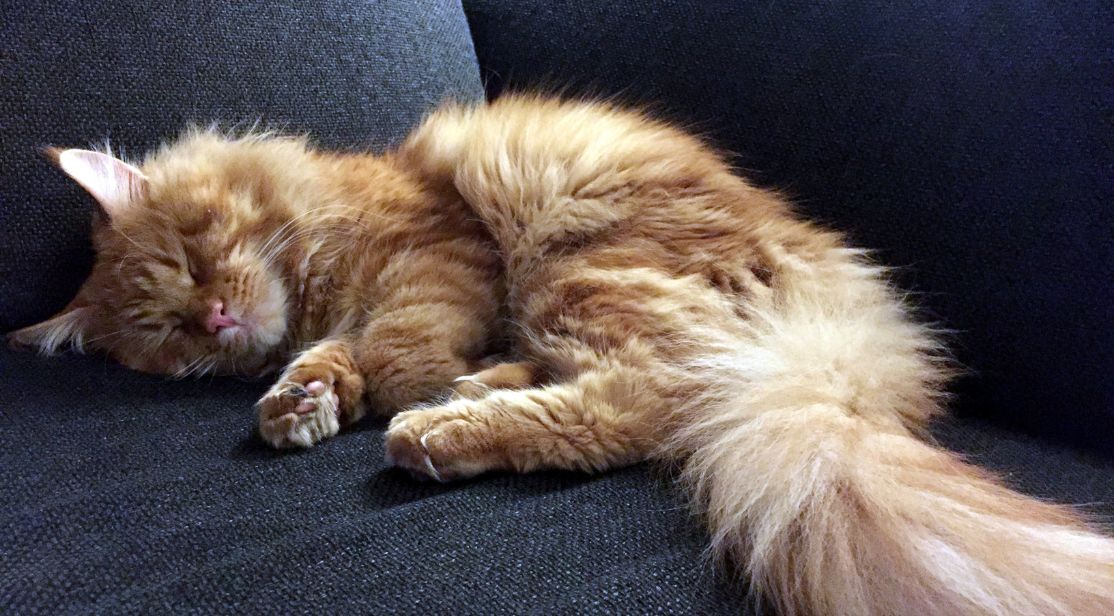
Overall Health Impact
- Longevity: Neutered cats often have a longer life expectancy due to the reduction in risks associated with roaming, fighting, and contracting infectious diseases.
- Quality of Life: It can improve the quality of life by reducing stress and behavioral problems related to mating instincts.
Maine Coon neutering has significant health benefits, primarily in reducing the risks of certain cancers and hormone-related diseases, and in improving behavior and longevity.
However, it also comes with some potential risks, such as weight gain and a slightly increased risk of certain conditions.
These risks can often be managed with proper diet, exercise, and regular veterinary care.
Consulting with a veterinarian can help determine the best timing and approach for each individual Maine Coon, taking into account their health, lifestyle, and any specific risks.
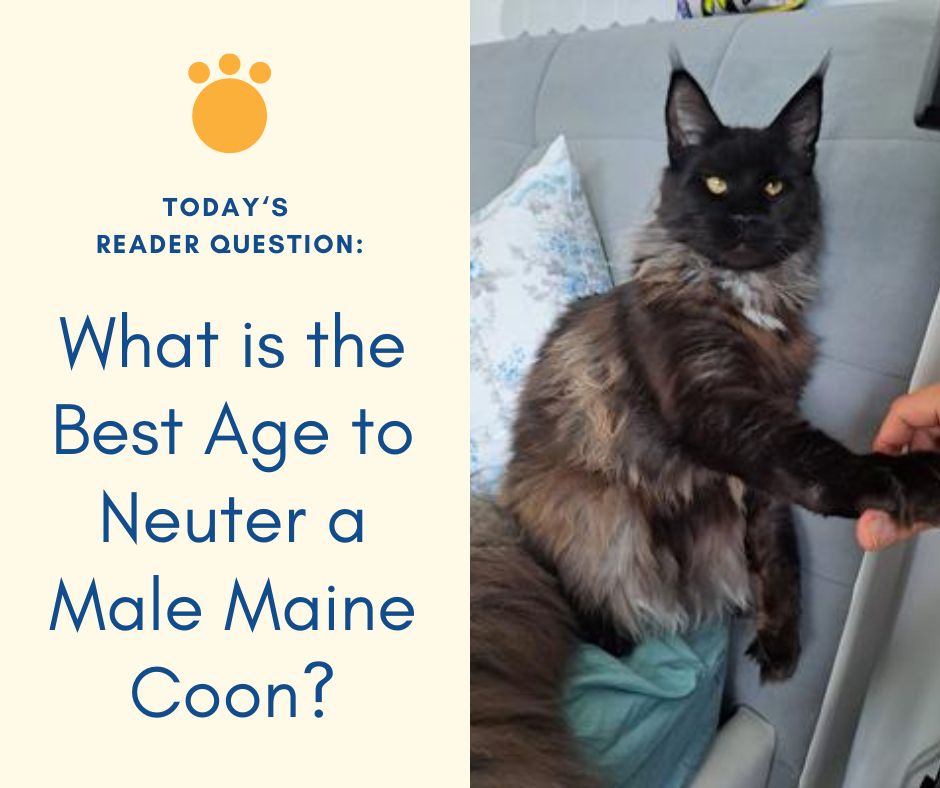
Question From Our Community:
Alex in Romania asks:
Hello,
Not long time ago, we added to our little family a gorgeous Maine Coon Male.
What will be the recommended age for Maine Coon neutering?
We asked around, and we had two different answers:
- Between 10 and 12 months.
- Between 12 and 18 months.
What will be your opinion on that?
Thank you.
Reply:
Hi Alex, he is gorgeous! What is his name?
As with many things in life, there isn't a right or wrong choice when there are multiple schools of thought, and it comes down to what's right for you, in your circumstances.
Side note:
Some people refer to this as Maine Coon castration, sterilizing or altering.
Neutering only applies to males - females are spayed. Spaying is a different procedure, with a different name, for the different anatomy involved.
The discussion over the best age to neuter a Maine Coon cat, with some recommending between 10 and 12 months and others suggesting 12 to 18 months, is based on various factors related to health, development, and behavioral considerations.
Here are the primary reasons for, or benefits to each philosophy:
Neutering Between 10 and 12 Months
Preventing Unwanted Behaviors:
Neutering at this age can help prevent or reduce unwanted behaviors associated with sexual maturity, such as spraying, marking territory, and aggression.
Earlier neutering can also curb the desire to roam and seek mates, which reduces the risk of accidents or injuries.
Population Control:
Spaying or neutering before felines reach sexual maturity helps control the population and prevents accidental litters, contributing to a reduction in the number of homeless cats.
Health Benefits:
Early neutering can reduce the risk of certain cancers and reproductive system diseases.
For males, it decreases the risk of testicular cancer and prostate problems.
(For female cats, early spaying reduces the risk of ovarian and uterine cancers, as well as mammary tumors.)
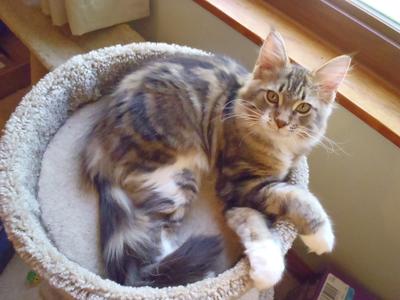 Toby
Toby
Maine Coon Neutering Between 12 and 18 Months
Physical Development:
Advocates for later neutering argue that allowing the cat to reach closer to full physical maturity can be beneficial for bone and muscle development.
Coonies are a large breed that continues growing for several years, and some believe that delaying Maine Coon neutering supports healthier growth.
Hormonal Influence:
The hormones associated with sexual maturity play a role in physical development.
Allowing these hormones to be present for a longer period may contribute to a more robust and well-developed skeletal and muscular system.
Behavioral Maturity:
Some cat owners and breeders prefer to let their Maine Coons reach a certain level of behavioral maturity before altering.
This can allow for more predictable personality traits and behavior patterns to emerge, which can be important for breeding decisions and understanding your Maine Coon's temperament.
Additional Considerations
Health Status:
The overall health and condition of each individual cat can influence the timing of the procedure.
Veterinarians may recommend different timings based on the specific health needs and risks.
Breeding Programs:
For breeders, the decision may also be influenced by whether the male is intended for breeding.
Breeding cats are typically not neutered until their breeding career is over, which usually extends beyond the age of 18 months.
Ultimately, the decision on when to neuter a Maine Coon should involve a discussion with your veterinarian.
This is the person who is best educated and equipped to provide personalized recommendations based on your Coonie's health, growth, and lifestyle.
In my case, I had a male and a female from the same litter. My vet recommended neutering and spaying at about age 5 months, which we did.
Looking back, I could have waited on Leo. But, everything went fine and they lived long and happy lives.
Very Useful Information
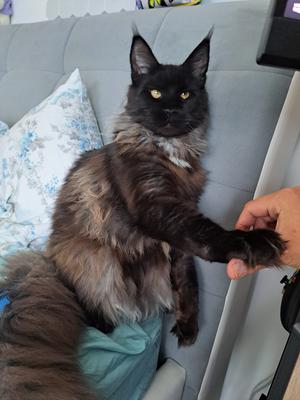
Alex replies: "Thank you so much for all the information.
This very helpful and will take it in consideration in our decision when to castrate him.
Just a side note,
The breeder advise us to do it before one year, and the veterinary doctor said to do it betwen 12 and 18 months. That's why we were a bit confused.
And to answer your question, his name is Midas, and he brings a lot of joy in our life."
Early Maine Coon Neutering Questions:
"What are the reasons that some advocate for castration even younger, such as at 5-6 months, or even younger like before going home to their new family at 12 weeks?"
Advocating for neutering Maine Coon cats at a younger age, such as at 5-6 months or even as early as 12 weeks, stems from several reasons related to health, behavior, and practical considerations. Here are the primary reasons:
Neutering at 5-6 Months
Early Prevention of Reproductive Health Issues:
Altering at this age can prevent the onset of diseases associated with the reproductive system, such as testicular cancer in males and ovarian and uterine cancers in females.
It also significantly reduces the risk of mammary tumors in females, particularly if spayed before their first heat.
Behavioral Benefits:
Early neutering can help prevent undesirable behaviors associated with sexual maturity, such as spraying, marking territory, aggression, and the urge to roam.
These behaviors are less likely to become established if castration is done before they begin.
Population Control:
Early neutering is a crucial strategy in controlling the pet population.
It ensures that cats do not contribute to the problem of unwanted litters, which can lead to overcrowded shelters and increased euthanasia rates.
Neutering Before 12 Weeks (Pediatric Neutering)
Logistical and Practical Benefits:
For breeders and shelters, neutering kittens before they go to their new homes eliminates the risk that new owners will fail to neuter them at an appropriate age.
This ensures that all kittens are neutered, contributing to responsible pet ownership and population control.
Rapid Recovery:
Younger kittens tend to recover more quickly from surgery compared to older cats. They experience less surgical stress and often resume normal activities more rapidly.
Behavioral Development:
Neutering very young kittens can help shape their behavior positively from an early age.
By preventing the onset of sexual behaviors, kittens are more likely to develop into well-adjusted pets without the complications of hormonally driven behaviors.
Veterinary Support for Early Neutering
Safety and Efficacy:
Studies and veterinary experience have shown that pediatric neutering (neutering at 12 weeks or younger) is safe and effective.
The procedures are well-tolerated by young kittens, with minimal risk of complications.
Long-term Health:
Research indicates that early neutering does not adversely affect long-term health and may even provide benefits such as reduced risk of certain cancers and diseases.
Addressing Concerns About Early Neutering
Growth and Development:
While there were initial concerns that early neutering could negatively impact growth and development, studies have shown that any differences in growth are minimal and do not adversely affect the overall health of the cat.
However, although this is the accepted stance, Maine Coons grow slowly and for a much longer period of time than the average cat. This must be taken into consideration when making your decision with your vet.
Bone and Muscle Development:
There is some evidence suggesting that early neutering may slightly delay the closure of growth plates, potentially resulting in slightly longer limbs.
In most cases, this is generally not considered a significant concern for overall health and functionality.
As in the above concern, the size and slow maturation of this breed is a factor. Some Coonie owners have shared experiences of hip problems due to neutering too early.
We suggest that you ask your breeder for a veterinary recommendation so your vet will be well-versed in the Maine Coon breed.
The decision to neuter at a very young age is often driven by the desire to ensure responsible pet ownership, reduce unwanted behaviors, and support overall health and population control efforts.
Both breeders and veterinarians advocate for early neutering based on these considerations, balancing the benefits against any potential risks.
As always, individual recommendations should be made in consultation with a veterinarian, taking into account the specific needs and circumstances of each cat.
Common Myths About Neutering Male Cats
Myth: Neutering Will Make My Cat Fat and Lazy
Fact: While neutering can lower a cat's metabolism, it doesn't directly cause obesity.
Weight gain is typically due to overfeeding and lack of exercise. Maintaining a balanced diet and encouraging regular play can keep a neutered cat healthy and active.
Myth: Neutering Changes a Cat's Personality for the Worse
Fact: It may reduce some undesirable behaviors like aggression, spraying, and roaming, but it doesn't negatively affect a cat's overall personality.
Most owners find their cats become more affectionate and calmer post-neutering.
Myth: It's Better to Let a Male Cat Mate Before Neutering
Fact: There is no benefit to allowing a male cat to mate before neutering. This belief stems from a misunderstanding of animal behavior and development. Neutering before sexual maturity can actually prevent the development of certain unwanted behaviors.
Myth: It is Cruel and Unnatural
Fact: Neutering is a common, safe, and humane procedure that prevents health problems and reduces the number of unwanted cats. It is widely supported by veterinarians and animal welfare organizations as beneficial for individual cats and the broader cat population.
Myth: Neutering a Cat Makes Him Less Protective
Fact: Cats don't exhibit protective behavior in the same way dogs might, and altering doesn't affect their ability to be alert or aware of their environment.
Cats' territorial instincts remain intact, though they may be less aggressive toward other animals.
Myth: Neutering is a Major Surgery with High Risks
Fact: Castration is a routine procedure with low risk when performed by a qualified veterinarian.
Complications are rare, and the benefits far outweigh the risks. Cats typically recover quickly and without issues.
Myth: Neutering Will Make My Cat Depressed
Fact: Cats do not experience depression in the way humans do due to neutering.
They may be quieter and less prone to certain behaviors related to mating, but they generally adapt well and maintain their usual levels of playfulness and affection.
Myth: Male Cats Need to Experience "Being a Tom" Before Altering
Fact: There is no psychological or physical benefit to allowing a male cat to mature fully as an intact tom.
Castration before the onset of sexual maturity can prevent the development of certain behaviors and health issues.
Benefits of Neutering
Understanding the benefits can help counter these myths:
- Reduces Risk of Certain Cancers: Eliminates the risk of testicular cancer and reduces the risk of prostate problems.
- Prevents Undesirable Behaviors: Decreases aggression, spraying, and roaming.
- Improves Quality of Life: Many neutered cats become more affectionate and less stressed.
- Contributes to Population Control: Helps reduce the number of unwanted kittens and the burden on shelters.
Maine Coon neutering is a responsible decision that offers numerous health and behavioral benefits.
Dispelling these myths with accurate information can help cat owners feel more confident about the procedure and its positive impact on their cat's life.
Consulting with a veterinarian can provide further personalized insights and address any concerns specific to your individual Maine Coon, so you can expect him to live a long and happy life!
